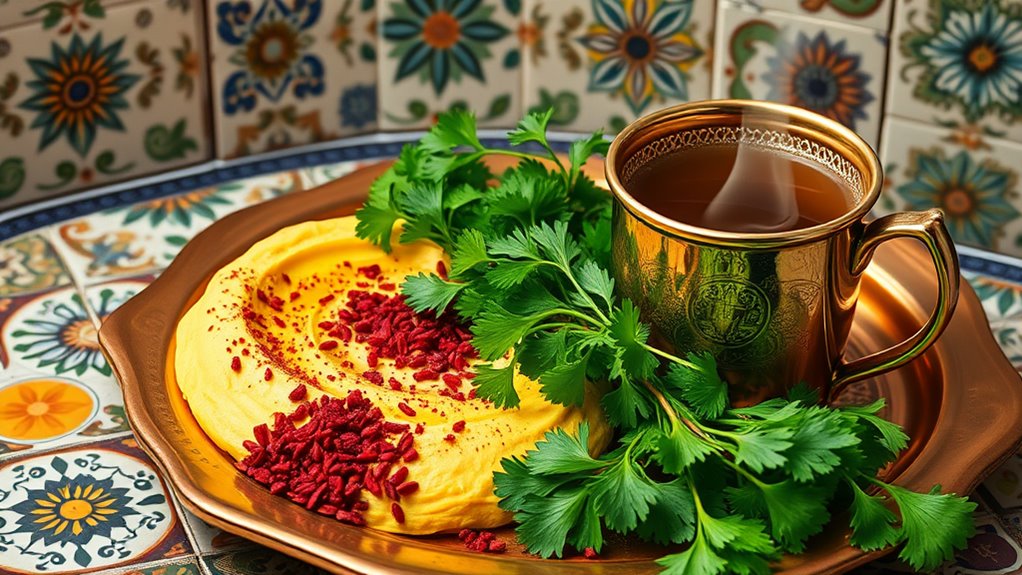The Influence of Arab Culture on World Cuisine
You’ll find that Arab culture has subtly shaped global cuisine. It’s introduced unique flavors, now integral to various dishes. What’s behind this influence, you might ask?
Want expert insights and top picks? Visit Zoom tuinisia Real Money Casino for the ultimate Zoom tuinisia casino experience!

Historical Roots of Arab Cuisine
As you delve into the historical roots of Arab cuisine, you’ll discover that its evolution is deeply intertwined with the region’s strategic location at the crossroads of ancient trade routes.
You’ll find that Arab cuisine’s unique blend of flavors and techniques is a result of cultural exchange and migration. The region’s historical significance as a hub of trade and commerce has influenced the development of its cuisine, shaping it into a distinct and refined culinary tradition.
You’ll uncover a rich history that’s reflected in the cuisine’s complexity and diversity, with each dish telling a story of the region’s past.
Spices and Ingredients of the Arab World
While exploring the spices and ingredients of the Arab world, you’ll find that they’re the building blocks of its distinctive cuisine, with each component playing a vital role in creating the complex flavor profiles that define Arab dishes.
You’ll discover a palette of aromatic spices, including cumin, coriander, and sumac, which add depth and warmth to various preparations. As you delve deeper, you’ll appreciate the nuances of ingredients like pomegranate molasses, olive oil, and fragrant herbs, which elevate the culinary experience.
These elements harmonize to create a rich gastronomic heritage that’s uniquely Arab.
Popular Middle Eastern Dishes
When you immerse yourself in the world of Middle Eastern cuisine, you’ll discover a diverse array of popular dishes that showcase the region’s rich culinary heritage.
You’ll encounter iconic dishes like shawarma, falafel, and kebabs, which blend flavors and textures in intricate ways. As you explore, you’ll notice the prevalence of fragrant spices, herbs, and tangy sauces.
These elements combine to create bold, aromatic flavors that define Middle Eastern cuisine. You’ll find that each dish is a testament to the region’s cultural exchange and culinary innovation, reflecting a deep history and tradition.
Flavorful and complex, they’ll leave you wanting more.
Arab Desserts and Sweets
Middle Eastern cuisine’s savory flavors don’t tell the whole story – you’ll also discover a sweet side that’s just as captivating.
You’ll find desserts like baklava, with its intricate layers of phyllo and nuts, and ma’amoul, a shortbread-like cookie filled with dates or nuts.
As you explore Arab desserts and sweets, you’ll notice the prominence of honey, rose water, and orange blossom water, which add depth and complexity to these treats.
You’ll appreciate the delicate balance of flavors and textures that make Arab desserts a true delight, with each bite a masterful blend of tradition and craftsmanship.
Global Adaptations of Arab Cuisine
How do the flavors and techniques of Arab cuisine translate across cultures, and what happens when you bring them to new shores?
As you explore global adaptations, you’ll find that Arab cuisine’s rich flavors and aromas have been seamlessly woven into diverse culinary traditions.
You’ll discover that dishes like shawarma and falafel have been reimagined in new contexts, incorporating local ingredients and spices.
The result is a fascinating blend of old and new, as Arab cuisine’s essence is reinterpreted and refined, reflecting the complexities of cultural exchange and adaptation.
You experience this fusion in every bite.
Modern Arab Cuisine and Its Evolution
As you delve into the realm of modern Arab cuisine, you’ll find that it’s a dynamic, ever-evolving entity, shaped by the region’s rich history, cultural diversity, and innovative spirit.
You’ll discover a unique blend of traditional flavors and contemporary twists, as chefs don’t hesitate to experiment with new ingredients and techniques.
Modern Arab cuisine is a fusion of old and new, where ancient spices meet modern presentation.
It’s an exciting culinary landscape that’s constantly evolving, and you’ll find it’s full of surprises, with each dish telling a story of the region’s cultural heritage and creativity.
losing Remarks
You’ve witnessed the profound impact of Arab culture on global cuisine, as it seamlessly weaves together rich flavors and techniques. With each dish, you’re experiencing a delicate harmony of spices, ingredients, and traditions. As you explore this culinary landscape, you’ll discover the beauty of Arab gastronomy, evolving and adapting, yet remaining true to its heritage, a testament to the power of cultural exchange.




